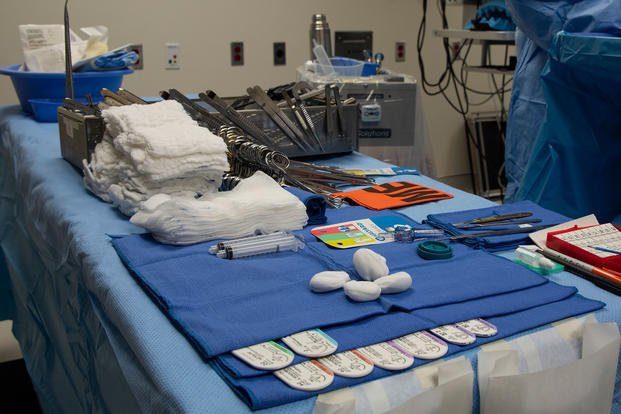Officers with Higher Rank Get Better Care than Those with Lower Ranks at Military Hospitals, Study Finds
By Patricia Kime
On May 17, 2024

Officers who outrank their military physicians and personnel who have been recently promoted receive better attention and care in Defense Department health facilities than lower-ranking service members, new research on military emergency room visits has found.
The study, published Thursday in the journal Science, also found racial bias in treatment and care in military ERs, with white physicians “exerting less effort” on Black patients.
While the study also found that white physicians treated higher-ranking Black patients with more care, their treatment was still only on par with lower-ranking white patients. Black military doctors treated lower-ranking patients of either race fairly equally, the study found, but they provided high-ranking Black patients “off-the-charts” care.
The researchers, with the University of Texas at San Antonio and Carnegie Mellon University, conducted the study to further understand implicit bias in health care in civilian settings as well as military care. Stephen Schwab, the study’s co-author, said that, while bias regarding gender and race is often the subject of research, the role that power dynamics play in medical services is less understood.
The military, with its obvious rank structure, presents opportunities to understand this relationship, he said.
“The military is doing everything it can to reduce these biases. Part of it is understanding the scope of the issue. It’s not just race and gender, it’s also power and wealth,” Schwab, a retired Army lieutenant colonel who now works at the University of Texas at San Antonio, said in an interview with Military.com on Friday.
For the study, the researchers examined data from 1.5 million emergency department visits in the military health system, looking at the rank of a patient compared with the doctor’s rank and examining treatment response, including resources expended such as medical tests, imaging and certain prescriptions, and outcomes, such as hospital admissions at the time of the ER visit or within 30 days afterward.
They found that higher-ranking patients received 3.6% more physician effort and resources and were 15% less likely than lower-ranking patients to have poor outcomes.
Lower-ranking patients seen by doctors attending to higher-ranking patients at the same time were 3.4% more likely to have poorer outcomes, according to the study.
“Our findings indicate that power confers nontrivial advantages: ‘High-power’ patients (who outrank their physician) receive more resources and have better outcomes than equivalently ranked ‘low-power’ patients. Patient promotions even increase physician effort. Furthermore, low-power patients suffer if their physician concurrently cares for a high-power patient,” the researchers wrote.
The military health system serves nearly 1.3 million active-duty personnel of all ranks, in addition to military family members, retirees and their families, in 51 hospitals and 424 clinics. The active-duty force is 18% officer and nearly 82% enlisted, 82.5% male and 17.5% female. Roughly 69% of the force is white, while 31.2% identify as a person of color.
The research looked at how physicians responded to or treated officers of higher rank than themselves, as well as equal and lower-ranked officers, and enlisted personnel.
Additional trends that were observed included a finding that male physicians are more rank-conscious and respond to a patient’s “power” more than female doctors did and showed more sex-based discrimination than female physicians.
Male physicians also were significantly more responsive to higher-ranking female patients than male patients, possibly because high-ranking women are still fairly uncommon across the services, perhaps eliciting “more respect and attention,” the research said.
Schwab said the findings demonstrate that physicians are “human” and, as such, are susceptible to implicit bias. But there may be other factors at play, such as a high-ranking patient demanding care or unknowingly drawing it as leadership.
The concern with such bias is what Schwab called “the spillover effect”: If physicians are spending more time with their peers or those of higher rank, then other patients are getting less attention.
“The effort has to come from somewhere,” Schwab said.
Schwab said the research was supported by the military health system through access to records and data support. The study, he added, lends value to medicine as a whole because it is an opportunity to show that implicit bias exists in the profession and the perception of power plays a role.
As a retired financial officer for the military health system, Schwab said he recognized that he likely received more attentive health care in the system from his colleagues than other troops.
“It’s hard to tell [bias] as an individual patient because you get the care you get, but I definitely felt I received more respect because of my circumstances,” Schwab said.
He said the study was not designed to place blame on physicians; instead, it was meant to raise awareness of implicit bias to influence education and training.
“We want people to recognize that these implicit biases exist, and we can address them by developing physicians that are more representative of society or improving training for our physicians,” Schwab said.
A spokesman for the Defense Health Agency said the organization is reviewing the article and its supporting materials but would not comment on the findings until they could be thoroughly reviewed.
DHA spokesman Peter Graves said the agency “is committed to delivering the highest quality of care to all of our patients, regardless of rank, race, color, sex, gender identity, religion, age or any other demographic.”
“We always expect the same high standards to be applied to every patient in an exceptional way, anytime, anywhere, always,” Graves said.
This piece was republished from the Military.com.